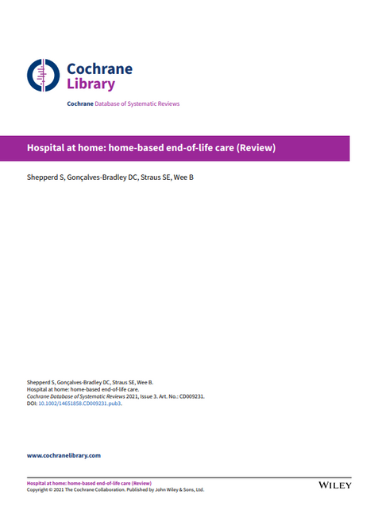Hospital at home: home‐based end‐of‐life care
The evidence included in this review supports the use of home‐based end‐of‐life care programmes for increasing the number of people who will die at home. Research that assesses the impact of home‐based end‐of‐life care on caregivers and admissions to hospital would be a useful addition to the evidence base, and might inform the delivery of these services.
Author: Sasha Shepperd, Daniela C. Goncalves-Bradley, Sharon E. Straus, Bee Wee
Publication Date: March 2021
Abstract (abridged):
Background: The policy several countries is to provide people with a terminal illness the choice of dying at home; this is supported by surveys that indicate that the general public and people with a terminal illness would prefer to receive end‐of‐life care at home. This is the fifth update of the original review.
Objectives: To determine if providing home‐based end‐of‐life care reduces the likelihood of dying in hospital and what effect this has on patients' symptoms, quality of life, health service costs and caregivers compared with inpatient hospital or hospice care.
Authors' conclusions: The evidence included in this review supports the use of home‐based end‐of‐life care programmes for increasing the number of people who will die at home. Research that assesses the impact of home‐based end‐of‐life care on caregivers and admissions to hospital would be a useful addition to the evidence base, and might inform the delivery of these services.
Access: Free
Keywords: palliative care, end-of-life care



